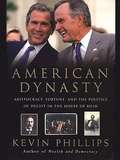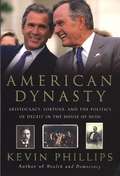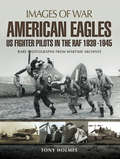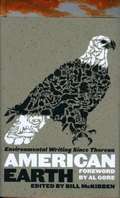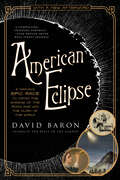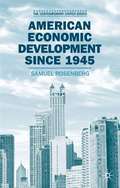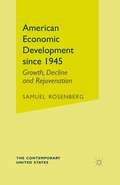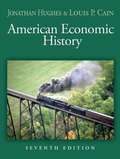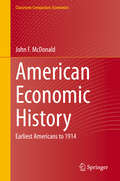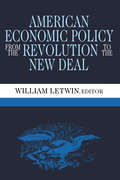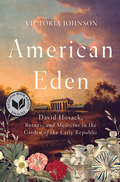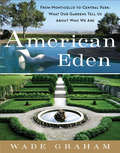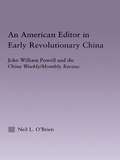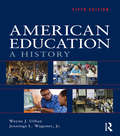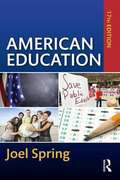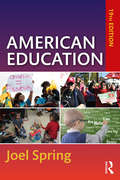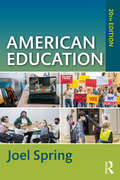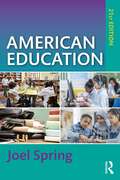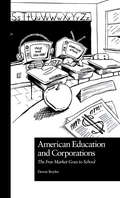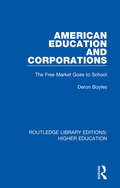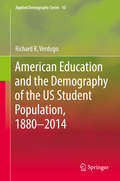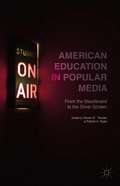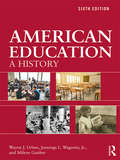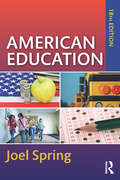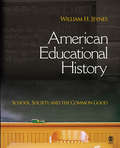- Table View
- List View
American Dynasty
by Kevin PhillipsThe Bushes are the family nobody really knows, says Kevin Phillips. This popular lack of acquaintance—nurtured by gauzy imagery of Maine summer cottages, gray-haired national grandmothers, July Fourth sparklers, and cowboy boots—has let national politics create a dynasticized presidency that would have horrified America's founding fathers. They, after all, had led a revolution against a succession of royal Georges. In this devastating book, onetime Republican strategist Phillips reveals how four generations of Bushes have ascended the ladder of national power since World War One, becoming entrenched within the American establishment—Yale, Wall Street, the Senate, the CIA, the vice presidency, and the presidency—through a recurrent flair for old-boy networking, national security involvement, and political deception. By uncovering relationships and connecting facts with new clarity, Phillips comes to a stunning conclusion: The Bush family has systematically used its financial and social empire—its "aristocracy"—to gain the White House, thereby subverting the very core of American democracy. In their ambition, the Bushes ultimately reinvented themselves with brilliant timing, twisting and turning from silver spoon Yankees to born-again evangelical Texans. As America—and the world—holds its breath for the 2004 presidential election, American Dynasty explains how it happened and what it all means. .
American Dynasty: Aristocracy, Fortune, and the Politics of Deceit in the House of Bush
by Kevin PhillipsThe Bushes are the family nobody really knows, says Kevin Phillips. This popular lack of acquaintance—nurtured by gauzy imagery of Maine summer cottages, gray-haired national grandmothers, July Fourth sparklers, and cowboy boots—has let national politics create a dynasticized presidency that would have horrified America’s founding fathers. They, after all, had led a revolution against a succession of royal Georges. In this devastating book, onetime Republican strategist Phillips reveals how four generations of Bushes have ascended the ladder of national power since World War One, becoming entrenched within the American establishment—Yale, Wall Street, the Senate, the CIA, the vice presidency, and the presidency—through a recurrent flair for old-boy networking, national security involvement, and political deception. By uncovering relationships and connecting facts with new clarity, Phillips comes to a stunning conclusion: The Bush family has systematically used its financial and social empire—its "aristocracy"—to gain the White House, thereby subverting the very core of American democracy. In their ambition, the Bushes ultimately reinvented themselves with brilliant timing, twisting and turning from silver spoon Yankees to born-again evangelical Texans. As America—and the world—holds its breath for the 2004 presidential election, American Dynasty explains how it happened and what it all means.
American Eagles: Rare Photographs From Wartime Archives (Images of War)
by Tony HolmesAmerican Eagles provides a photographic snapshot of the lives of the American fighter pilots who volunteered their services during World War II, as well as the Spitfires and Hurricanes they flew. Keen to help Britain stem the spread of Fascism, or perhaps seeking adventure in a foreign land, a number of American citizens defied the wishes of their government by crossing the border into Canada and subsequently sailing to Britain to join the Royal Air Force. Some were prewar civilian pilots, others were rich playboys and a few were already serving in the RAF when war was declared. Men such as Don Blakeslee, Billy Fiske, 'Gus' Daymond and Jim Dunn, as well as many other notable pilots are featured in this volume, in photographs that have been carefully sourced from official and private archives across the globe. Each image has a detailed caption, chronicling the wartime exploits of the elite 'band of brothers' known as the American Eagles.
American Earth: Environmental Writing Since Thoreau
by Al Gore Bill MckibbenAs America and the world grapple with the consequences of global environmental change, writer and activist Bill McKibben offers this unprecedented, provocative, and timely anthology, gathering the best and most significant American environmental writing from the last two centuries. Classics of the environmental imagination'the essays of Henry David Thoreau, John Muir, and John Burroughs; Aldo Leopold's A Sand County Almanac; Rachel Carson's Silent Spring are set against the inspiring story of an emerging activist movement, as revealed by newly uncovered reports of pioneering campaigns for conservation, passages from landmark legal opinions and legislation, and searing protest speeches. Here are some of America's greatest and most impassioned writers, taking a turn toward nature and recognizing the fragility of our situation on earth and the urgency of the search for a sustainable way of life. Thought-provoking essays on overpopulation, consumerism, energy policy, and the nature of "nature" join ecologists' memoirs and intimate sketches of the habitats of endangered species. The anthology includes a detailed chronology of the environmental movement and American environmental history, as well as an 80-page color portfolio of illustrations.
American Eclipse: A Nation's Epic Race To Catch The Shadow Of The Moon And Win The Glory Of The World
by David BaronLonglisted for the PEN/E.O. Wilson Prize for Literary Science Writing Winner of the AIP Science Communication Award An Amazon Best Book of the Year (Science) A St. Louis Post-Dispatch Best Book of the Year Finalist for the Colorado Book Award (Nonfiction) Booklist Editors’ Choice (Science & Technology) Featuring a new afterword priming readers for the total solar eclipse of 2024, this “essential” (BBC) account brilliantly captures the celestial and human drama of eclipses. With this “suspenseful narrative history” (Maureen Corrigan, NPR’s Fresh Air), award-winning science writer David Baron tells the story of the enterprising scientists—among them, planet hunter James Craig Watson, pioneering astronomer Maria Mitchell, and ambitious young inventor Thomas Edison—who raced to Wyoming and Colorado in the summer of 1878, at the dawn of the Gilded Age, to observe the first great American eclipse. Thrillingly recreating the fierce jockeying of these nineteenth-century astronomers, Baron draws on years of “exhaustive research to reconstruct a remarkable chapter of U.S. history” (Lee Billings, Scientific American), when the fate of American science still hung precariously in the balance. Now updated with an afterword that unites eclipses and eclipse-chasers past and present—revisiting the total solar eclipse of 2017 and looking forward to that of 2024—American Eclipse reveals the enduring power of these ethereal events to bring people together across space and time.
American Economic Development Since 1945: Growth, Decline And Rejuvenation (Contemporary United States Ser.)
by Samuel RosenbergThis clearly-written book provides an historical analysis of postwar economic development in the United States, helping the reader to understand the nation's current economic position. Samuel Rosenberg investigates three postwar phases: the creation of an institutional framework setting the stage for prosperity in the U. S. after World War II; the forces undermining this institutional framework and the resulting stagflation of the 1970s; and the recreation of a new institutional structure in the 1980s. Basic economic concepts are introduced and explained throughout and specific attention is paid to macroeconomic policy, industrial relations, the role of the U. S. in the world economy, social and labour policy, the structure of the labour force, and the distribution of income by race and gender.
American Economic Development since 1945: Growth, Decline and Rejuvenation (The Contemporary United States)
by S. RosenbergThis clearly-written book provides an historical analysis of postwar economic development in the United States, helping the reader to understand the nation's current economic position. Samuel Rosenberg investigates three postwar phases: the creation of an institutional framework setting the stage for prosperity in the U.S. after World War II; the forces undermining this institutional framework and the resulting stagflation of the 1970s; and the recreation of a new institutional structure in the 1980s. Basic economic concepts are introduced and explained throughout and specific attention is paid to macroeconomic policy, industrial relations, the role of the U.S. in the world economy, social and labour policy, the structure of the labour force, and the distribution of income by race and gender.
American Economic History
by Louis P. Cain Jonathan R. T. HughesIn simple, elegant language, Hughes and Cain walk students through four centuries of political, social, and economic history, with a focus on laws and institutions and an emphasis on current economic topics that reflects the latest scholarship. Rich in both quantitative techniques and economic theory, American Economic History demonstrates how an understanding of our past can illuminate economic issues that face society today and in the future.
American Economic History: Earliest Americans to 1914 (Classroom Companion: Economics)
by John F. McDonaldThis textbook introduces undergraduate and advanced undergraduate students to the economic foundations of America. Providing a rigorous yet accessible exploration of American Economic History from pre-Columbian times up to 1914, it explains the economic and demographic nuances of colonial America, including the Spanish, French, and English colonies and how they were governed. The book presents the details of the controversy between the English colonists and the English Parliament. It further features the impact of slavery, the Revolutionary and Civil War eras, and it includes extensive economic analysis of the post Civil War nation up to 1914. Based on the author's lectures, the book allows an easy understanding of the economic evolution from the earliest Americans to World War I. Instructors can customize their curriculum by supplementing this fundamental text with additional readings, offering flexibility while ensuring a solid knowledge of the economic aspects of American history.
American Economic Policy from the Revolution to the New Deal
by William LetwinThe documents in this volume reflect the great debates that have shaped this country's economic life. Covering a wide variety of problems, they show how each was treated at a moment when it was politically urgent. Since they were efforts at persuasion, usually addressed to a wide audience, they are coherent and self-contained and avoid technical jargon. They therefore present clear and vivid evidence of what men have desired and hoped to achieve, and explain not only much that is critical about how Americans lived in the past but much also about the inheritance of the present.From the overwhelming mass of available documents, a representative group has been chosen here. Among the twenty-nine included are: Hamilton's Report on Manufactures, which helped set the American attitude on economic growth; Andrew Jackson's veto message on the bill to renew the charter of the Bank of the United States; the first annual report of the Interstate Commerce Commission, which put the railroads under federal regulation; William Jennings Bryan's famous Cross of Gold speech, which helped him win the Democratic nomination in 1896; the conclusions of the Pujo Committee's report on the money market, which were instrumental in setting up the Federal Reserve System; and key documents on the National Recovery Administration, one of Franklin D. Roosevelt's major moves in his fight against the depression.In his introductory essay, the editor summarizes the forces and movements that helped to make American economic policy "exceedingly confused and therefore very annoying to historians and economists," But, he insists, this very confusion reduced "the extremism and disorder potentially so great in the United States . . . to remarkable moderation."
American Eden: David Hosack, Botany, And Medicine In The Garden Of The Early Republic
by Victoria JohnsonThe untold story of Hamilton’s—and Burr’s—personal physician, whose dream to build America’s first botanical garden inspired the young Republic. <P><P>On a clear morning in July 1804, Alexander Hamilton stepped onto a boat at the edge of the Hudson River. He was bound for a New Jersey dueling ground to settle his bitter dispute with Aaron Burr. Hamilton took just two men with him: his “second” for the duel, and Dr. David Hosack. <P><P>As historian Victoria Johnson reveals in her groundbreaking biography, Hosack was one of the few points the duelists did agree on. Summoned that morning because of his role as the beloved Hamilton family doctor, he was also a close friend of Burr. A brilliant surgeon and a world-class botanist, Hosack—who until now has been lost in the fog of history—was a pioneering thinker who shaped a young nation. <P><P>Born in New York City, he was educated in Europe and returned to America inspired by his newfound knowledge. He assembled a plant collection so spectacular and diverse that it amazes botanists today, conducted some of the first pharmaceutical research in the United States, and introduced new surgeries to American. His tireless work championing public health and science earned him national fame and praise from the likes of Thomas Jefferson, James Madison, Alexander von Humboldt, and the Marquis de Lafayette. <P><P>One goal drove Hosack above all others: to build the Republic’s first botanical garden. Despite innumerable obstacles and near-constant resistance, Hosack triumphed when, by 1810, his Elgin Botanic Garden at last crowned twenty acres of Manhattan farmland. “Where others saw real estate and power, Hosack saw the landscape as a pharmacopoeia able to bring medicine into the modern age” (Eric W. Sanderson, author of Mannahatta). Today what remains of America’s first botanical garden lies in the heart of midtown, buried beneath Rockefeller Center. <P><P>Whether collecting specimens along the banks of the Hudson River, lecturing before a class of rapt medical students, or breaking the fever of a young Philip Hamilton, David Hosack was an American visionary who has been too long forgotten. Alongside other towering figures of the post-Revolutionary generation, he took the reins of a nation. In unearthing the dramatic story of his life, Johnson offers a lush depiction of the man who gave a new voice to the powers and perils of nature.
American Eden: From Monticello to Central Park to Our Backyards
by Wade GrahamThe story of our nation and ourselves as told through our country's most significant gardens and their creators. From Frederick Law Olmsted to Richard Neutra, Michelle Obama to our neighbors, Americans throughout history have revealed something of themselves--their personalities, desires, and beliefs--in the gardens they create. Rooted in the time and place of their making, as much as in the minds and identities of their makers, gardens mirror the struggles and energies of a changing society. Melding biography, history, and cultural commentary in a one-of-a-kind narrative, American Eden presents a dynamic, sweeping look at this country's landscapes and the visionaries behind them. Monticello's gardens helped Jefferson reconcile his conflicted feelings about slavery-and take his mind off his increasing debt. Edith Wharton's gardens made her feel more European and superior to her wealthy but insufficiently sophisticated countrymen. Martha Stewart's how-to instructions helped bring Americans back into their gardens, while at the same time stoking and exploiting our anxieties about social class. Isamu Noguchi's and Robert Smithson's experiments reinvigorated the age-old exchange between art and the garden. American Eden offers an inclusive definition of the garden, considering intentional landscapes that range from domestic kitchen gardens to city parks and national parks, suburban backyards and golf courses, public plazas and Manhattan's High Line park, reclaimed from freight train tracks. And it exposes the overlap between garden-making and painting, literature, and especially architecture-the garden's inseparable sibling-to reveal the deep interconnections between the arts and their most inspired practitioners. Moving deftly through time and place across America's diverse landscapes--from Revolutionary-era Virginia to turn-of-the-century Chicago to 1960s suburban California--and featuring a diverse cast of landscape-makers--whether artists, architects, or housewives, amateurs or professionals, robber barons, politicians, reformers, or dreamers--Wade Graham vividly unfolds the larger cultural history through more personal dramas. Beautifully illustrated with color and black-and-white images, American Eden is at once a different kind of garden book and a different kind of American history, one that offers a compelling, untold story--a saga that mirrors and illuminates our nation's invention, and constant reinvention, of itself.
American Editor in Early Revolutionary China: John William Powell and the China Weekly/Monthly Review
by Neil O'BrienThis is a study of Sino-American relations and the editorial policy of the China Weekly Review / China Monthly Review , published in Shanghai by John William Powell during the Chinese Civil War and the Korean War. The Review supported US attempts in early 1946 to avert civil war through the creation of a coalition government. By 1947 it reflected growing disillusionment with Guomindang policies, and increasing sympathy for the demands of impoverished students and faculty for multi-party democracy and peace. As the Civil War shifted in favour of the Communists in late 1948, Powell and the Review counseled US businessmen to remain in Shanghai and urged the US government to establish working relations with the Communists, and later to recognize the new regime. Staying in Shanghai to report changes engendered by the Communist victory, the Review 's staff accomodated themselves to the new orthodoxy and to the regime's coordination of the press. During the Korean War, the Review opposed the expanding US air war, becoming the foremost American purveyor of Chinese and North Korean allegations of American use of bacteriological weapons. The Review was also utilized for the political indoctrination of US prisoners-of-war by the Chinese and North Koreans. After closing the Review in July 1953 and returning to the United States, Powell, his wife Sylvia Campbell and assistant editor Julian Schuman were put on trial for sedition. As the government narrowed its focus to the bacteriological warfare issue, Powell and his lawyers countered by trying to prove the veracity of the charges, seeking witnesses in China and North Korea. Adverse publicity led to a mistrial in January 1959 and limitations in both the sedition and treason statutes ended plans to renew prosecution. Powell and the Review had insisted that positive diplomatic and economic relations between China and the United States were both possible and desirable. The gradual normalization of trade, investment and political relations since the 1970s seemed to validate this belief. In the post-Cold War age when Sino-American relations are often strained and tempestuous, this book serves as a reminder of the value of making the extra effort to achiece understanding.
American Education
by Wayne J. Urban Jennings L. Wagoner Jr.American Education: A History, 5e is a comprehensive, highly-regarded history of American education from pre-colonial times to the present. Chronologically organized, it provides an objective overview of each major period in the development of American education, setting the discussion against the broader backdrop of national and world events. The first text to explore Native American traditions (including education) prior to colonization, it also offers strong, ongoing coverage of minorities and women. This edition includes more visual illustrations as well as new or expanded attention to the Jacksonian era and the politics surrounding the Common School, the McGuffey Readers, church-school-immigrant conflicts and accommodations, the Morrill Acts, community colleges, youth organizations, the impact of the Great Depression and the Dust Bowl years, education and the Civilian Conservation Corps, National Youth Administration, and the No Child Left Behind (NCLB) and Race to the Top (RttT) legislation. Also, a new epilogue provides closing comments on the present and future prospects for American education. Balanced Perspective - The authors provide contrasting views of American educational traditions, reforms, and theories in order to maintain a balanced view of events. They also set discussions against the broader backdrop of national and world events. Pre-colonial Focus - A unique and much praised opening chapter discusses the educational traditions of Native Americans and the two-way learning exchanges that occurred between two distinct "old world" cultures, that is, between Native American and European cultures. The Indians taught as well as learned from the colonists. No other text has this feature. Cultural Conflict Focus - Throughout the text attention is paid to the cultural conflicts embedded in the majority-minority struggles of Native Americans and various immigrant groups throughout the nation's history. Chapter 5, Class, Caste and Education in the South, concentrates on the subjugation of African Americans and the use of education to both facilitate and fight that subjugation. Readability - Reviewers have labelled this the "best written text on the market" in terms of style, clarity and interest. "It's clarity and readability differentiate it from other books."
American Education
by Joel SpringJoel Spring's American Education introduces readers to the historical, political, social, and legal foundations of education and to the profession of teaching in the United States. In his signature straightforward and concise approach to describing complex issues, Spring illuminates events and topics and that are often overlooked or whitewashed, giving students the opportunity to engage in critical thinking about education. In this edition he looks closely at the global context of education in the U.S. Featuring current information and challenging perspectives--with scholarship that is often cited as a primary source, students will come away from this clear, authoritative text informed on the latest topics, issues, and data and with a strong knowledge of the forces shaping of the American educational system. Changes in the 17th Edition include new and updated material and statistics on economic theories related to "skills" education and employability the conflict between a skills approach and cultural diversity political differences regarding education among the Republican, Democratic, Libertarian and Green parties social mobility and equality of opportunity as related to schooling global migration and student diversity in US schools charter schools and home schooling
American Education (Sociocultural, Political, and Historical Studies in Education)
by Joel SpringFeaturing current information and challenging perspectives on the latest issues and forces shaping the American educational system—with scholarship that is often cited as a primary source—Joel Spring introduces readers to the historical, political, social, and legal foundations of education and to the profession of teaching in the United States. In his signature straightforward, concise approach to describing complex issues, he illuminates events and topics that are often overlooked or whitewashed, giving students the opportunity to engage in critical thinking about education. Students come away informed on the latest topics, issues, and data and with a strong knowledge of the forces shaping the American educational system. Thoroughly updated throughout, the new edition of this clear, authoritative text remains fresh and up-to-date, reflecting the many changes in education that have occurred since the publication of the previous edition. Topics and issues addressed and analyzed include: • The decline of the Common Core State Standards, particularly as result of a Republican-controlled administration currently in place• Increasing emphasis on for-profit education, vouchers, charter schools, and free-market competition between schools, expected to surge with the appointment of the new U.S. Secretary of Education Betsy DeVos • Current debates about immigration and "Dreamers"—new statistics on immigrant education, discussion of education proposals to accommodate the languages, cultures, and religions of newly arrived immigrants• New education statistics on school enrollments, dropouts, education and income, school segregation, charter schools, and home languages• The purposes of education as presented in the 2016 platforms of the Republican, Democratic, Green, and Libertarian parties• Discussions around transgender students
American Education (Sociocultural, Political, and Historical Studies in Education)
by Joel SpringFeaturing current information and challenging perspectives on the latest issues and forces shaping the American educational system—with scholarship that is often cited as a primary source—Joel Spring introduces readers to the historical, political, social and legal foundations of education and to the profession of teaching in the United States. In his signature straightforward, concise approach to describing complex issues, he illuminates events and topics that are often overlooked or whitewashed, giving students the opportunity to engage in critical thinking about education. Students come away informed on the latest topics, issues and data and with a strong knowledge of the forces shaping the American educational system. Thoroughly updated throughout, the 20th edition of this clear, authoritative text remains fresh and up to date, reflecting the many changes in education that have occurred since the publication of the previous edition, such as: The effects of the pandemic on schools, teachers, students, learning and social goals The latest U.S. Department of Education guidelines for school prayer, regulations on sexual harassment and Title IX and guidelines for writing IEPs Expanded discussion of institutional racism Coverage relating to transgender youth and athletics
American Education (Sociocultural, Political, and Historical Studies in Education)
by Joel SpringFeaturing current information and challenging perspectives on the latest issues and forces shaping the American educational system—with scholarship that is often cited as a primary source—Joel Spring introduces readers to the historical, political, social and legal foundations of education and to the profession of teaching in the United States. In his signature straightforward, concise approach to describing complex issues, he illuminates events and topics that are often overlooked or whitewashed, giving students the opportunity to engage in critical thinking about education. Students come away informed on the latest topics, issues and data and with a strong knowledge of the forces shaping the American educational system. Updated throughout, the 21st edition of this clear, authoritative text remains fresh and up-to-date, reflecting the many changes in education that have occurred since the publication of the previous edition. New coverage includes: Discussion of “culture wars” and critical race theory Parental rights versus the goals of common education LGBTQIA+ students’ rights Discussion of the current administration’s educational policies
American Education and Corporations: The Free Market Goes to School (Pedagogy and Popular Culture #2)
by Deron BoylesThis work argues that private businesses use public schools as worker training sites, resulting in a devalued teaching force, students as uncritical consumers, and schools as economic markets. Boyles analyzes school-business partnerships, revealing false philanthropy and the ulterior motives behind fast-food reading campaigns and supermarket sales for schools promotions. This important book criticizes the practice of privatization itself, revealing it to be a conservative gambit to secure class differences, and not a simple extension of free market business influence into the public sector.
American Education and Corporations: The Free Market Goes to School (Routledge Library Editions: Higher Education #2)
by Deron BoylesOriginally published in 1998, American Education and Corporations, provides a detailed study of the effects of commercialisation on the public school system. The book provides a powerful indictment of corporate culture and its influence on American public schooling, within a clear theoretical framework. The book looks at the threat of corporate culture to public education and advocates an understanding of the democratic importance of schooling as a public good.
American Education and the Demography of the US Student Population, 1880–2014 (Applied Demography Series #10)
by Richard R. VerdugoThis monograph examines changes in the American public school population from 1900 to 2010. It shows how different historical periods have affected the composition of the student body and have posed important challenges to those involved in shaping educational policy. The author first develops an analytical framework that merges education and applied demography concepts. The education concepts include attendance, promotion, retention, high school graduation, and college enrollment. While, the applied demography concepts take into account size, distribution, and composition. He then applies this framework to the four most recent American historical periods: the Progressive Era, the Great Depression, the Post WWII Era, and the Post 1983 Era. Readers will come to understand the changing socio-demographic profile of American schools due to such factors as immigration from Europe, child labor laws, internal migration, greater fertility and the rise of the Baby Boom generation, the changing status of women and minorities, the urban crises, rising social inequality, the 2008 recession, and globalization. Featuring both historical and current data, this volume clearly shows how demographic change affects the teaching and learning environment, education policy, funding, and school segregation. Overall, it offers insightful analysis that may help shape the future of American education.
American Education in Popular Media
by Sevan G. Terzian Patrick A. RyanAmerican Education in Popular Media examines how popular media including mass magazines, radio, film, and television have represented schooling in the United States over the course of the twentieth century. Historical essays explore prevalent portrayals of students and professional educators while addressing contested purposes of schooling in American society. Terzian and Ryan highlight the educative and normative dimensions of popular media in outlining roles for teachers, students, and administrators at educational institutions ranging from elementary schools to universities.
American Education: A History (Patterson's American Education Ser.)
by Wayne Milton Gaither Jennings J. Urban L. WagonerThis is a lively account of one of the most important and overlooked themes in American education. Beginning in the colonial period and working to the present, Gaither describes in rich detail how the home has been used as the base for education of all kinds. The last five chapters focus especially on the modern homeschooling movement and offer the most comprehensive and authoritative account of it ever written. Readers will learn how and why homeschooling emerged when it did, where it has been, and where it may be going.
American Education: From The Puritans To The Trump Era (Sociocultural, Political, and Historical Studies in Education)
by Joel SpringFeaturing current information and challenging perspectives on the latest issues and forces shaping the American educational system—with scholarship that is often cited as a primary source, Joel Spring introduces readers to the historical, political, social, and legal foundations of education and to the profession of teaching in the United States. In his signature straightforward, concise approach to describing complex issues, he illuminates events and topics that are often overlooked or whitewashed, giving students the opportunity to engage in critical thinking about education. Students come away informed on the latest topics, issues, and data and with a strong knowledge of the forces shaping the American educational system. Thoroughly updated throughout, the 18th edition of this clear, authoritative text remains fresh and up to date, reflecting the many changes in education that have occurred since the publication of the previous edition. Topics and issues addressed and analyzed include • The decline of the Common Core State Standards, particularly as result of a Republican-controlled administration currently in place • Increasing emphasis on for-profit education, vouchers, charter schools and free-market competition between schools, expected to surge with the appointment of the new U.S. Secretary of Education Betsy DeVos • Current debates about immigration and "Dreamers"—new statistics on immigrant education, discussion of education proposals to accommodate the languages, cultures and religions of newly arrived immigrants • New education statistics on school enrollments, dropouts, education and income, school segregation, charter schools and home languages • The purposes of education as presented in the 2016 platforms of the Republican, Democratic, Green, and Libertarian parties • Discussions around transgender students
American Educational History: School, Society, and the Common Good
by William H. JeynesAmerican Educational History: School, Society, and the Common Good is an up-to-date, contemporary examination of historical trends that have helped shape schools and education in the United States. Author William H. Jeynes places a strong emphasis on recent history, most notably post-World War II issues such as the role of technology, the standards movement, affirmative action, bilingual education, undocumented immigrants, school choice, and much more!
